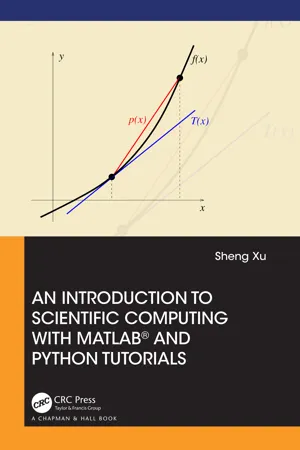
- 384 pages
- English
- ePUB (mobile friendly)
- Available on iOS & Android
An Introduction to Scientific Computing with MATLAB® and Python Tutorials
About this book
This textbook is written for the first introductory course on scientific computing. It covers elementary numerical methods for linear systems, root finding, interpolation, numerical integration, numerical differentiation, least squares problems, initial value problems and boundary value problems. It includes short Matlab and Python tutorials to quickly get students started on programming. It makes the connection between elementary numerical methods with advanced topics such as machine learning and parallel computing.
This textbook gives a comprehensive and in-depth treatment of elementary numerical methods. It balances the development, implementation, analysis and application of a fundamental numerical method by addressing the following questions.
•Where is the method applied?
•How is the method developed?
•How is the method implemented?
•How well does the method work?
The material in the textbook is made as self-contained and easy-to-follow as possible with reviews and remarks. The writing is kept concise and precise. Examples, figures, paper-and-pen exercises and programming problems are deigned to reinforce understanding of numerical methods and problem-solving skills.
Tools to learn more effectively

Saving Books

Keyword Search

Annotating Text

Listen to it instead
Information
Table of contents
- Cover Page
- Half-Title Page
- Title Page
- Copyright Page
- Dedication Page
- Contents
- Preface
- Author
- 1 An Overview of Scientific Computing
- 2 Taylor's Theorem
- 3 Roundoff Errors and Error Propagation
- 4 Direct Methods for Linear Systems
- 5 Root Finding for Nonlinear Equations
- 6 Interpolation
- 7 Numerical Integration
- 8 Numerical Differentiation
- 9 Initial Value Problems and Boundary Value Problems
- 10 Basic Iterative Methods for Linear Systems
- 11 Discrete Least Squares Problems
- 12 Monte Carlo Methods and Parallel Computing
- Appendices
- Index
Frequently asked questions
- Essential is ideal for learners and professionals who enjoy exploring a wide range of subjects. Access the Essential Library with 800,000+ trusted titles and best-sellers across business, personal growth, and the humanities. Includes unlimited reading time and Standard Read Aloud voice.
- Complete: Perfect for advanced learners and researchers needing full, unrestricted access. Unlock 1.4M+ books across hundreds of subjects, including academic and specialized titles. The Complete Plan also includes advanced features like Premium Read Aloud and Research Assistant.
Please note we cannot support devices running on iOS 13 and Android 7 or earlier. Learn more about using the app